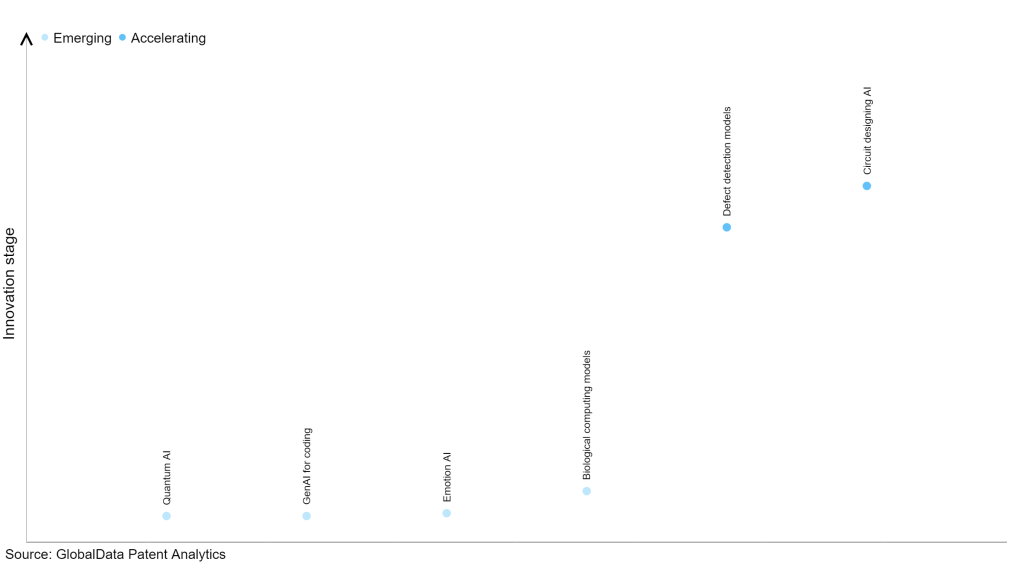The technology industry continues to be a hotbed of patent innovation. Activity is driven by the escalating complexity of electronic devices and the demand for more efficient and compact designs, coupled with the increasing availability of powerful computational resources and the integration of machine learning algorithms, as well as the growing importance of technologies such as evolutionary algorithms, reinforcement learning, and neural architecture search. In the last three years alone, there have been over 1.5 million patents filed and granted in the technology industry, according to GlobalData’s report on Artificial intelligence in technology: circuit designing AI. Buy the report here.

Access deeper industry intelligence
Experience unmatched clarity with a single platform that combines unique data, AI, and human expertise.
However, not all innovations are equal and nor do they follow a constant upward trend. Instead, their evolution takes the form of an S-shaped curve that reflects their typical lifecycle from early emergence to accelerating adoption, before finally stabilizing and reaching maturity.
Identifying where a particular innovation is on this journey, especially those that are in the emerging and accelerating stages, is essential for understanding their current level of adoption and the likely future trajectory and impact they will have.
185+ innovations will shape the technology industry
According to GlobalData’s Technology Foresights, which plots the S-curve for the technology industry using innovation intensity models built on over 1.6 million patents, there are 185+ innovation areas that will shape the future of the industry.
Within the emerging innovation stage, quantum AI, GenAI for coding and emotion AI are disruptive technologies that are in the early stages of application and should be tracked closely. Biological computing models, defect detection models, and circuit designing AI are some of the accelerating innovation areas, where adoption has been steadily increasing.
Innovation S-curve for artificial intelligence in the technology industry

Circuit designing AI is a key innovation area in artificial intelligence
Circuit designing AI involves employing artificial intelligence (AI) methods to automate and enhance the circuit design process. This encompasses the utilization of machine learning algorithms and other AI techniques to increase the precision and efficiency of circuit design.
GlobalData’s analysis also uncovers the companies at the forefront of each innovation area and assesses the potential reach and impact of their patenting activity across different applications and geographies. According to GlobalData, there are 65+ companies, spanning technology vendors, established technology companies, and up-and-coming start-ups engaged in the development and application of circuit designing AI.
Key players in circuit designing AI – a disruptive innovation in the technology industry
‘Application diversity’ measures the number of applications identified for each patent. It broadly splits companies into either ‘niche’ or ‘diversified’ innovators.
‘Geographic reach’ refers to the number of countries each patent is registered in. It reflects the breadth of geographic application intended, ranging from ‘global’ to ‘local’.
Among the companies innovating in circuit designing AI, Taiwan Semiconductor Manufacturing is one of the leading patents filers. The company’s patents are aimed at developing a process of creating a netlist for an IC device that involves several steps. Initially, the dimensions of a gate region, encompassing the width from one edge to another of the active region, are extracted. Additionally, the distance from the width's initial point to a gate via positioned along it is determined. Following this, a first gate resistance value for the gate region is obtained. Subsequently, a second gate resistance value is calculated using the derived distance and width. Finally, the netlist is modified based on both the initial and calculated gate resistance values. The other prominent patent filers in the space include ASML and Samsung Group.
In terms of application diversity, Taiwan Semiconductor Manufacturing leads the pack, while Samsung Group and ASML stood in the second and third positions, respectively. By means of geographical reach, Nikon held the top position, followed by Apple and MicroUnity Systems Engineering.
Circuit designing AI significantly accelerates the design process by automating tasks that would otherwise be time-consuming and labour-intensive. It leads to faster development cycles and allows engineers to focus on higher-level design considerations. Additionally, circuit designing AI has the capability to optimize circuits for performance, power consumption, and other key metrics, resulting in more efficient and reliable electronic devices.
To further understand the key themes and technologies disrupting the technology industry, access GlobalData’s latest thematic research report on Artificial Intelligence (AI).
Data Insights
From

The gold standard of business intelligence.
Blending expert knowledge with cutting-edge technology, GlobalData’s unrivalled proprietary data will enable you to decode what’s happening in your market. You can make better informed decisions and gain a future-proof advantage over your competitors.







